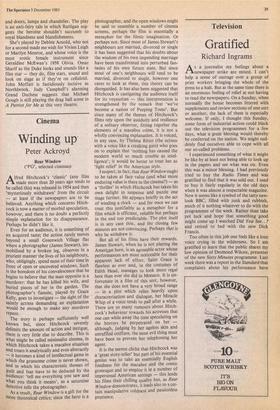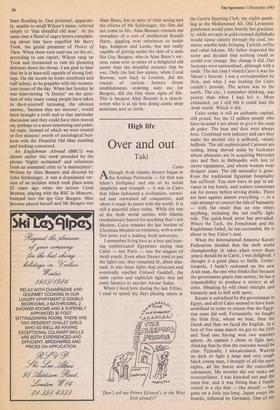Television
Gratified
Richard Ingrams
As a journalist my feelings about a newspaper strike are mixed. I can't
help a sense of outrage over a group of print workers bringing• the whole of the press to a halt. But at the same time there is an enormous feeling of relief at not having to read the newspapers. On a Sunday, when normally the house becomes littered with supplements and review sections of one sort or another, the lack of them is especially welcome. If only, I thought this Sunday, some form of industrial action could black out the television programmes for a few days, what a great blessing would thereby be conferred on the nation. We might sud- denly find ourselves able to cope with all our so-called problems.
I experienced something of what it might be like by at least not being able to look up in the papers and see what was on. Even this was a minor blessing. I had previously tried to buy the Radio Times and was gratified to find that it was sold out. I used to buy it fairly regularly in the old days when it was almost a respectable magazine. Now it seems like a symbol of the tatty new- look BBC, filled with junk and rubbish, much of it nothing whatever to do with the programmes of the week. Rather than take pot luck and hope that something good might come up I watched Did You See.. ? and retired to bed with the new Dick Francis.
Too often in this job one feels like a lone voice crying in the wilderness. So I am gratified to learn that the public shares my low opinion of Desmond Wilcox, presenter of the new Sixty Minutes programme. Last week there was a report in the Standard that complaints about his performance have
been flooding in. One protester, apparent- ly, unable to recall Wilcox's name, referred simply to 'that dreadful old man'. At the same time a flood 'of angry letters complain- ing about him have engulfed Mr Barry Took, the genial presenter of Points of View. When these were read out on the air, according to one report, Wilcox rang up Took and threatened to ram his gleaming dentures down his throat. I am glad to hear that he is at least.still capable of strong feel- ings. On the screen he looks moribund and half asleep, as he grapples with the momen- tous issues of the day. When last Sunday he was interviewing 'A Doctor' on the ques- tion of why many young people have taken to do-it-yourself tattooing, the obvious answer, 'because they are morons', would have brought a swift end to that particular discussion and they could have then moved on, perhaps to a more interesting and point- ful topic. Instead of which we were treated to five minutes' worth of sociological bun- kum with the Dreadful Old Man nodding and looking concerned.
An Englishman Abroad (BBC1) was shown earlier this week preceded by the phrase 'highly acclaimed' and references from an unnamed critic to 'a masterpiece'. Written by Alan Bennett and directed by John Schlesinger, it was a dramatised ver- sion of an incident which took place some 25 years ago when the actress Coral Browne, playing with the RSC in Moscow, bumped into the spy Guy Burgess. Miss Browne played herself and Mr Burgess was
Alan Bates, but in spite of their acting and the efforts of Mr Schlesinger, the film did not come to life. Alan Bennett reminds me nowadays of a sort of intellectual Russell Harty, giggling over references to inside legs, kedgeree and Leeds, but not really capable of getting under the skin of a man like Guy Burgess, who in Alan Bates's ver- sion, came over as more of a delightful old queen than the dreadful monster that he was. Only the last few scenes, when Coral Browne, now back in London, did the rounds of various Jermyn Street establishments ordering suits etc for Burgess, did the film show signs of life. This is because Alan Bennett is a sketch- writer who is at his best doing comic shop assistants and so forth.















































 Previous page
Previous page